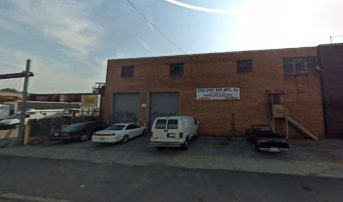
94 N 13th Street, as it was in August 2007. Image Credit: Google Maps.
Property owner sought tax benefits for remediating contaminated sites already under voluntary State remediation consent order. In 2007, National Grid signed a consent order with the New York City Department of Environmental Conservation (DEC) to remediate hazardous wastes from National Grid’s closed manufactured gas plant sites. National Grid removed some of the hazardous waste from two adjacent sites located at 94 N. 13th Street and 121 N. 12th Street, Brooklyn.
In 2014, Wythe Berry, LLC acquired the two sites from National Grid and became responsible for removing the remaining hazardous wastes. Wythe Berry intended to develop the sites into a hotel, retail space, and office space.
Wythe Berry applied for tax benefits under the DEC’s Brownfield Cleanup Program, a program that provides state tax benefits to owners who remove contamination from polluted sites.
The Department denied Wythe Berry’s application, finding that Wythe Berry was already responsible for remediating the sites under the earlier consent order.
Supreme Court Justice Wavny Toussaint agreed with the DEC, ruled against Wythe Berry, and held that the DEC properly denied the application. Justice Toussaint found that because National Grid was already financially responsible for the cleanup, the sites could not qualify for tax benefits under the Brownfield Program.
The Appellate Division, Second Department, reversed the lower court’s decision, found the DEC’s ruling irrational and unreasonable, and remitted the case to the DEC to reconsider Wythe Berry’s Brownfield application. The court ruled that a contaminated site is not ineligible solely because it is to be remediated under a prior consent order. The purpose of the Brownfield program is to enhance the health, safety, and welfare of the people of New York. The fiscal impact on the State as a result of approving an application is irrelevant and should not be factored into DEC’s Brownfield decisions. Although owners who are subject to state enforcement actions are ineligible for the tax benefit, voluntary consent orders, such as National Grid’s, are not considered state enforcement actions.
Wythe Berry, LLC v. N.Y. State Dep’t of Env. Conservation, 137 N.Y. S. 3d 91 (2d Dep’t 2020).
By: Elizabeth Valldejuli (Elizabeth is a New York Law School graduate, Class of 2021.)


Note that the state sought review of this decision that was denied. As a result, the NYSDEC is no longer denying applications for sites that are covered by the multi-site orders.
denial of motion for leave to appeal to Court of Appeals is at https://www.nycourts.gov/reporter/motions/2021/2021_71445.htm